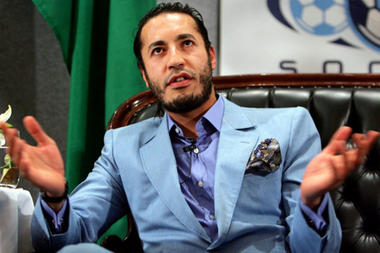By Hadi Fornaji.

Tripoli, 8 September:
South Africa may be preparing to grant asylum to Saadi Qaddafi, son of the former dictator Muammar . . .[restrict]Qaddafi, pending a decision by the United Nations to let him leaver Niger, where he has been residing for the past year.
Saadi is currently the subject of a travel-ban imposed by the UN Security Council, meaning that he cannot leave Niger without risking arrest.
His Israeli lawyer, Nick Kaufman, submitted an application to the UN Sanctions Committee to grant a one-off waiver from the ban back in July, and that request is currently under review.
Niger has hitherto rebuffed requests from Tripoli to extradite Saif to Libya, citing concerns that he would not receive a fair trial.
“It’s no secret that the minister for foreign affairs in Niger, Bazoum Mohamed, has given his permission for my client to leave the country,” Kaufman told the France 24 news agency in Jerusalem.
“We’re now checking our options to see where he could possibly go.”
Kaufman has refused to confirm whether South Africa is the favoured destination, saying only that Saadi had been in contact with a number of countries and that he had “been in contact with the most senior officials in those countries”.
However, the news agency cited un-named sources who said that South Africa had agreed to welcome him.
Whilst genuine concerns over the question of a fair trial may well be at play, both Niger and South Africa have something of a luke-warm relationship with Libya’s new rulers.
South Africa was notoriously reluctant to abandon the Qaddafi regime during last year’s revolution, and only recognised the NTC as the legitimate ruling authoritiy in Libya on 20 September last year, one month after the fall of Tripoli.
There are also believed to be concerns in Cape Town regarding the mistreatment of some black Africans in Libya, accused either of being mercenaries or of fighting for the regime during the uprising.
Meanwhile the relationship between Niger and Libya has been fractious ever since it emerged that Nigeriens were amongst mercenaries flown in by Qaddafi last year.
In addition to Saadi, the country has also granted asylum to a number of other Qaddafi loyalists, including a trio of generals.
Relations between Libya and Niger reached a low-ebb in March of this year, when the government in Niamey announced the appointment of Bashir Saleh Bashir, Qaddafi’s former chief of staff, as an advisor to Nigerien President Mahamadou Issoufou, complete with a diplomatic passport, although that decision was reversed shortly afterwards.
[/restrict]







